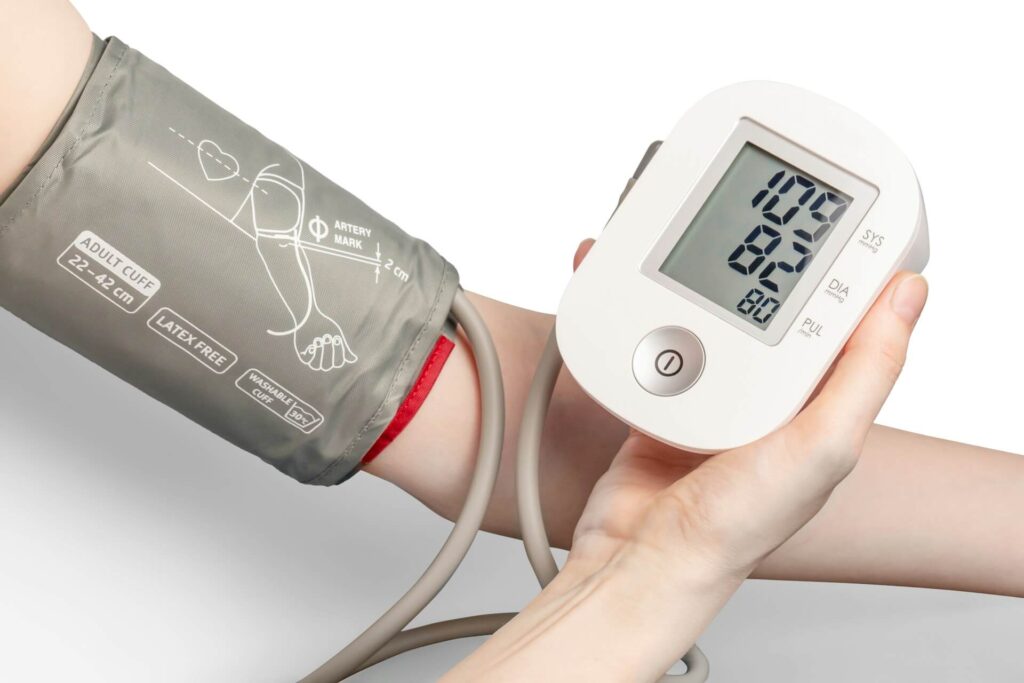Will Testosterone Replacement Therapy Raise Your Blood Pressure?
Yes, Testosterone Replacement Therapy (TRT) can potentially increase blood pressure in some individuals. This increase in blood pressure is primarily attributed to TRT’s stimulatory effect on red blood cell production.
When red blood cell levels rise, it leads to an increase in the viscosity, or thickness, of the blood. Thicker blood flows more slowly and requires more pressure to move through the body’s blood vessels, which can elevate blood pressure.
Additionally, TRT might influence hormonal balance and fluid retention, further impacting blood pressure.
However, it’s important to note that the effect of TRT on blood pressure can vary widely among individuals. Factors like the patient’s age, baseline health, existing cardiovascular conditions, and the dosage and administration method of testosterone can all influence this outcome.
Is TRT Safe Even With High Blood Pressure?

Testosterone therapy can be safe for individuals with high blood pressure, but it requires careful management and close monitoring. The safety of TRT in the context of hypertension largely depends on individual health factors, the severity of the high blood pressure, and how well it is being managed.
TRT can potentially increase blood pressure due to its effect on stimulating red blood cell production, which increases blood viscosity. This effect might exacerbate existing hypertension.
Individuals with elevated blood pressure should be properly evaluated by a healthcare professional before starting TRT. This evaluation should assess cardiovascular risk, blood pressure control, and the potential benefits concerning individual health conditions.
In some cases, TRT may actually lead to improvements in cardiovascular health, particularly in men with low testosterone levels who are experiencing symptoms that impact their quality of life. However, these potential benefits need to be weighed against the risks, particularly in the context of hypertension.
Consequences of High Blood Pressure On TRT

Untreated high blood pressure while on testosterone therapy can have serious health consequences.
1. Cardiovascular Complications
Cardiovascular complications encompass a range of disorders affecting the heart and blood vessels, posing significant health risks. These complications include conditions such as heart disease, hypertension, stroke, heart attacks, and peripheral artery disease.
Cardiovascular complications can lead to life-threatening events, such as heart attacks and strokes, which are among the leading causes of death worldwide.
2. Increased Risk Of Blood Clots
An increased risk of blood clots, medically known as thrombosis, can have serious consequences for one’s health. Blood clots can form in veins or arteries and disrupt normal blood flow.
In the context of untreated high blood pressure and TRT, the risk of blood clots can be amplified. High blood pressure damages blood vessel walls, making them more susceptible to clot formation.
TRT, by increasing red blood cell production and blood viscosity, can further promote clot formation. Blood clots can lead to conditions like deep vein thrombosis (DVT) or pulmonary embolism, both of which can be life-threatening if left untreated.
3. Organ Damage
Chronic hypertension puts continuous strain on the cardiovascular system, leading to damage in vital organs. The heart may thicken and weaken, while the arteries can become narrowed and less flexible.
This can result in heart attacks, strokes, and kidney damage. TRT’s potential impact on blood viscosity can further stress these organs. Kidneys, in particular, may suffer from reduced blood flow. Timely intervention, including medication and lifestyle changes, is critical to prevent or mitigate organ damage and preserve long-term health.
How To Manage Blood Pressure While On TRT

Treating high blood pressure while on testosterone replacement therapy requires a careful and coordinated approach. It’s important to work closely with healthcare providers, including the physician managing the TRT and a primary care physician or cardiologist.
1. Monitor Blood Pressure Regularly
Regular checks help in the early detection of blood pressure changes, allowing for timely interventions. This can be done at home using a reliable blood pressure monitor or at a healthcare provider’s office.
Consistent monitoring provides valuable data that can guide adjustments in testosterone dosage, lifestyle modifications, and medication management. It empowers individuals to understand how various factors, including diet, exercise, stress, and TRT, influence their blood pressure, fostering a proactive approach in maintaining cardiovascular health and overall well-being.
2. Lifestyle Changes
Anyone wanting to start a proper TRT regimen should make the necessary lifestyle changes to accommodate the increased blood pressure risks. These modifications not only help in controlling blood pressure but also improve overall health and can enhance the effectiveness of TRT.
Dietary Adjustments: Adopting a heart-healthy diet can improve elevated blood pressure. By increasing your intake of fruits, vegetables, whole grains, and low-fat dairy, while reducing foods high in saturated fats and cholesterol, you limit the chances of testosterone therapy increasing your blood pressure.
Regular Physical Activity: Engaging in regular exercise, such as brisk walking, cycling, or swimming, can significantly lower blood pressure and improve heart health. It’s recommended to aim for at least 150 minutes of moderate-intensity aerobic activity per week.
Weight Management: Losing even a small amount of weight if you’re overweight or obese can help reduce blood pressure.
Limiting Alcohol and Avoiding Tobacco: Excessive alcohol can raise blood pressure, so moderation is key. Patients should also avoid smoking as tobacco can damage blood vessels and increase the risk of hypertension.
Stress Management: Chronic stress can contribute to high blood pressure. Techniques such as meditation, deep breathing, yoga, or other relaxation practices can be effective in managing stress.
3. Medication Management
If lifestyle changes alone are insufficient, antihypertensive medications may be prescribed. These medications work in various ways to lower blood pressure, such as by relaxing blood vessels, reducing heart rate, or decreasing fluid in the body.
These medications must be taken as directed and maintain regular consultations with healthcare providers. They can adjust dosages, switch medications if necessary, and monitor for any interactions with TRT.
4. Monitoring and Adjusting Testosterone Dosage
Regular assessments by healthcare providers are crucial to evaluate the impact of TRT on blood pressure and overall health. Testosterone levels, blood pressure readings, and other cardiovascular risk factors should be routinely checked.
Based on these evaluations, adjustments to the TRT regimen may be necessary. This could involve altering the dosage, changing the administration method, or even temporarily halting therapy if adverse effects on blood pressure are significant. Tailoring TRT to the individual’s changing health status ensures its benefits while minimizing potential risks, including its impact on blood pressure.
Testosterone Levels and Blood Pressure Matter
If you are considering TRT, but have high blood pressure, I hope this brings a few important matters to light and helps you with deciding what approach to take for your treatments.
By adopting a comprehensive strategy that involves close coordination with healthcare providers, individuals can effectively manage their blood pressure while receiving TRT, ensuring overall health and well-being.

Ashlee is the Medical Director at Evolve Wellness and Health in Englewood, Colorado. She obtained her Master of Science in Nursing in 2006 from Colorado State University-Pueblo, and is board-certified through the American Nurses Credentialing Center as an Acute Care Nurse Practitioner. She has practiced in the field of hormone replacement therapy (both male and female) and medical weight loss since 2013.


